This presidential campaign has made Jewish history, for reasons good and bad. Bernie Sanders became the first Jewish candidate to win a U.S. presidential primary, and the families of both presidential nominees had strong Jewish ties.
But the campaign also saw heated debate on Israel and Iran and a troubling rise in anti-Semitism, specifically online invective directed at Jewish reporters. Here are the top Jewish moments — the uplifting, the expected and the frightening — that have taken place during the 2016 election cycle.
June 2015
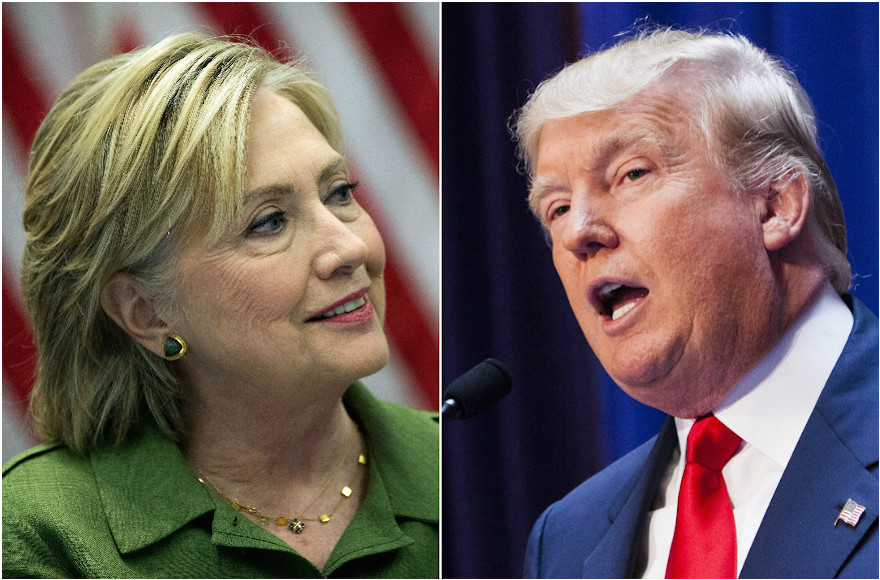
Hillary Clinton and Donald Trump (Clinton photo: Drew Angerer; Trump photo: Christopher Gregory/both Getty Images)
Hillary Clinton and Donald Trump launch their presidential campaigns. In his speech, Trump says Mexican immigrants to the United States bring drugs and crime, and that “[t]hey’re rapists.” His comments, as well as later calls to ban Muslims from entering the country, draw criticism from Jewish groups throughout the campaign and become the centerpiece of a national debate on immigration, religious freedom and civility in politics.
February 2016

Sen. Bernie Sanders waving in Concord on the day of the primary elections in New Hampshire, Feb. 9, 2016. (Spencer Platt/Getty Images)
Sanders, a 75-year-old, Brooklyn-born Independent from Vermont, wins the New Hampshire Democratic primary, making history as the first Jewish candidate to win a major party presidential primary. Drawing on a wildly enthusiastic youth vote, Sanders handily defeats Clinton, commanding 60 percent of the ballots to Clinton’s 38 percent.
Trump disavows the support of David Duke after earlier claiming he knew nothing about the former Ku Klux Klan leader’s views. In response, the Anti-Defamation League announces it will be providing all presidential candidates with information about hate groups, so they can better determine which endorsements to accept and reject.
March 2016
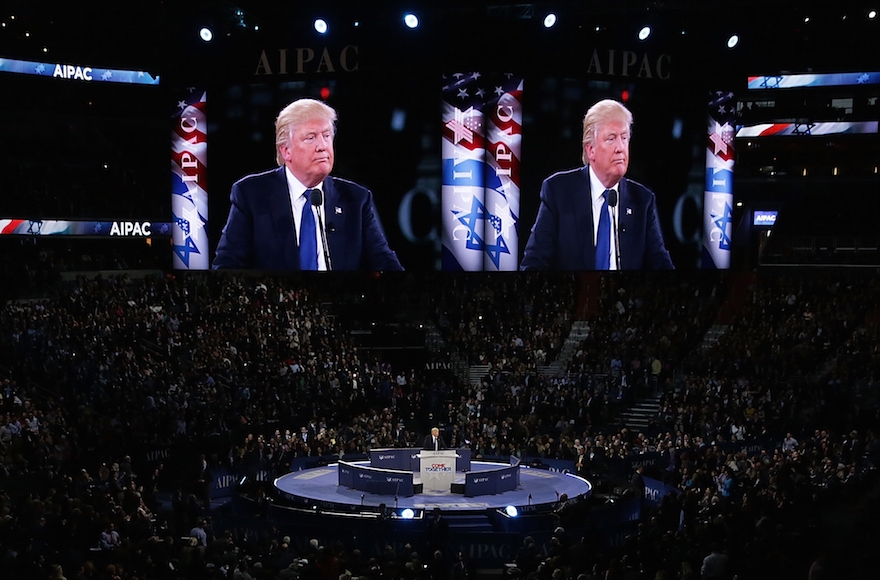
Donald Trump addressing the annual policy conference of the American Israel Public Affairs Committee in Washington, D.C., March 21, 2016. (Alex Wong/Getty Images)
Clinton and Trump, along with Republican presidential candidates Sen. Ted Cruz of Texas and Ohio Gov. John Kasich, address the American Israel Public Affairs Committee’s annual policy conference in Washington, D.C. Sanders turns down an invitation to speak, citing traveling plans and a busy campaign schedule, and AIPAC rejects his offer to appear via video link.
Trump, appearing amid walkouts by critics of his “bigotry,” gets a standing ovation from the crowd for a speech that his Jewish son-in-law, Jared Kushner, reportedly helped him write. Audience members cheer when Trump celebrates the conclusion of President Barack Obama’s term in office, prompting AIPAC later to apologize to the president for the attack and the loud applause it earned. Trump also mentions that his then-pregnant daughter Ivanka, a convert to Judaism, “is about to have a beautiful Jewish baby.” A week later, Ivanka gives birth to a son, but Trump chooses to campaign rather than attend the bris.
Meanwhile, Clinton derides Trump as a feckless negotiator and tells the AIPAC crowd that “walking away” from the Middle East is not an option for the United States. In her speech, she also recalls the U.S. failure to take in Jewish refugees from Nazi-occupied Europe and noted the forthcoming Purim holiday, when Esther risked her life to speak up against the oppression of Jews in a plea to stand up against bigotry. “Let us never be neutral or silent in the face of bigotry,” she urges the crowd.
April 2016

Ted Cruz, left, at a matzah factory in Brighton Beach, Brooklyn, April 7, 2016. (Screenshot from Twitter)
During a visit to Brooklyn ahead of the New York Republican primary, Cruz makes a presidential campaign stop at a matzah baking factory in Brooklyn. He helps bake the unleavened bread and joins in singing the traditional Passover song “Dayenu.”
Kasich gives Orthodox Jews in Brooklyn his interpretation of the Bible. He asks a group of yeshiva students, who likely spend their days studying Jewish texts, whether they had ever read about Joseph, and tells them that Abraham trumps Moses, whom many Jews consider to be the most important biblical figure.
Days ahead of the New York primary, Sanders and Clinton engage in a heated exchange over Israel at a debate in Brooklyn, with the Vermont senator accusing the former secretary of state of neglecting the Palestinians and reiterating his charge that Israel used disproportionate force in Gaza in 2014. Clinton says she worked hard to bring peace to the region as secretary of state. Clinton won the primary in New York, home to the country’s largest Jewish population, 58-42 percent.
Sanders suspends his Jewish outreach director after revelations of social media posts that used profanity to describe Israeli Prime Minister Benjamin Netanyahu. Simone Zimmerman, a former activist with J Street, reportedly called Netanyahu a “manipulative a**hole,” though she later changed the expletive to “politician.”
May 2016
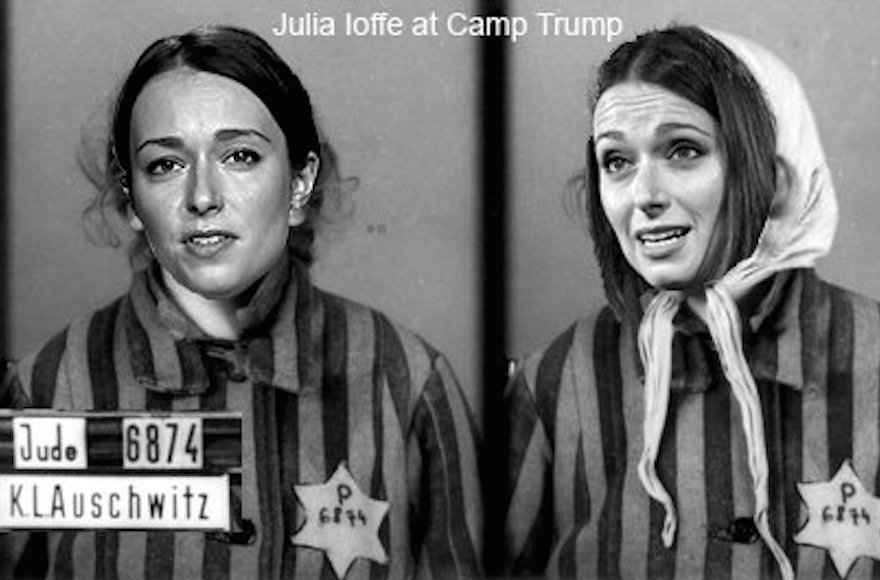
Jewish journalist Julia Ioffe received neo-Nazi death threats from Donald Trump supporters, including an image depicting her as a concentration camp inmate, after writing a profile of Melania Trump in GQ. (Screenshot from Twitter)
Julia Ioffe, a Jewish reporter who wrote a critical profile of Trump’s wife, Melania, is deluged with anti-Semitic phone calls and messages on social media from self-described Trump supporters, including a cartoon of her as a Jew being executed. Ioffe files a police complaint about the threats. Numerous other Jewish journalists receive similar threats from Trump backers, including New York Times editor Jonathan Weisman and Politico reporter Hadas Gold, leading the ADL to appoint a task force on the harassment of journalists.
Sheldon Adelson, the casino magnate and major backer of Republican candidates, endorses Trump for the presidency in an op-ed in The Washington Post. As Election Day approaches, however, Adelson reportedly gets increasingly frustrated with Trump and is said to shift his focus to maintaining Republican control of the Senate.
The Republican Jewish Coalition congratulates Trump after his primary victory in Indiana makes him the presumptive GOP presidential nominee. The statement offers no praise for Trump, but refers to Clinton as the “worst possible choice for a commander in chief.”
The pro-Trump site Breitbart News slams conservative commentator Bill Kristol for not supporting Trump, calling him a “Renegade Jew.” In August, the Clinton campaign references the incident in accusing the news site of being “anti-Semitic,” and a month later a Breitbart columnist calls a Washington Post columnist “a Polish, Jewish, American elitist.” Also in August, Trump — now the Republican nominee — names Breitbart News Chairman Stephen Bannon as his campaign manager.
Sanders names three prominent critics of Israel to the committee charged with formulating the Democratic Party platform: Rep. Keith Ellison, D-Minn., the first Muslim elected to Congress; James Zogby, the president of the Arab American Institute, and Cornel West, a philosopher and supporter of the anti-Israel Boycott, Divestment and Sanctions movement. Days later, Sanders releases a statement emphasizing that while he supports Israel’s right to live in peace, lasting peace will not come without “fair and respectful treatment of the Palestinian people.”
July 2016
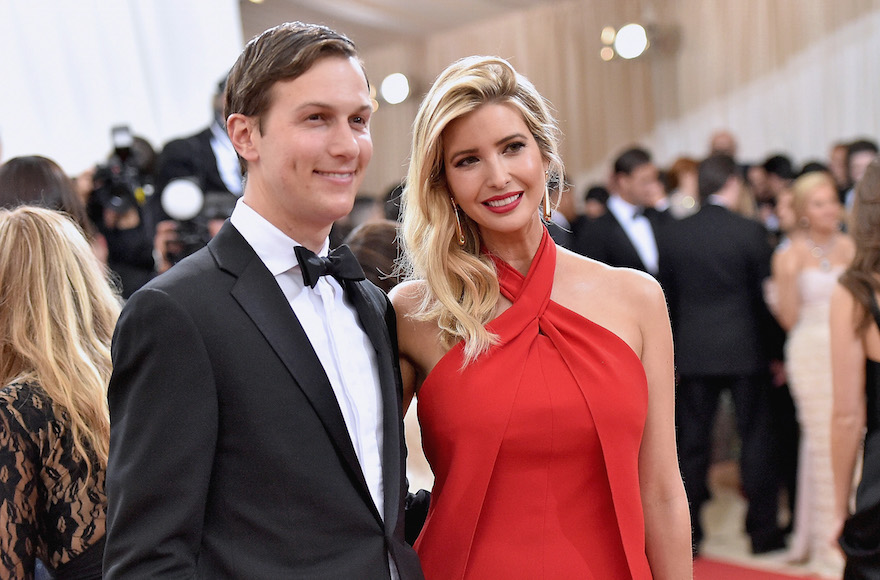
Jared Kushner and wife Ivanka Trump attending a gala at the Metropolitan Museum of Art in New York City, May 2, 2016. (Mike Coppola/Getty Images for People.com)
Trump is criticized after retweeting an image of Clinton that features a six-pointed star reminiscent of a Star of David and a background of dollar bills. The image, which critics note originated among the anti-Semitic denizens of the budding “alt-right” movement, is later deleted, against Trump’s wishes.
In response to the Star of David tweet, the ADL and 27 other Jewish groups sign an open letter condemning racism, xenophobia and other forms of intolerance. Jared Kushner responds to his father-in-law’s critics in the pages of his newspaper, The Observer. “I know that Donald does not at all subscribe to any racist or anti-Semitic thinking,” Kushner writes, citing his own grandparents experience as Holocaust survivors.
The Republican Party’s Platform Committee unanimously agrees to language on Israel that omits references to a two-state solution, a longtime bipartisan policy in the region. The change comes with little resistance from the pro-Israel lobby AIPAC.
Rabbi Haskel Lookstein, the prominent modern Orthodox rabbi who oversaw Ivanka Trump’s conversion to Judaism, withdraws from speaking at the Republican National Convention. His initial decision to speak there was seen as an endorsement of Donald Trump and drew criticism, including a petition started by alumni of The Ramaz School, where Lookstein formerly served as principal.
Clinton becomes the first female presidential nominee of a major U.S. political party on the second evening of the Democratic National Convention. Sanders endorses Clinton for president. At a rally in New Hampshire, Sanders says he will work with the former secretary of state to keep Trump from being elected.
Rep. Debbie Wasserman Schultz, D-Fla., steps down as leader of the Democratic National Committee following the emergence of emails showing that senior DNC staffers sought to undercut the Sanders campaign. One email, from Chief Financial Officer Brad Marshall, alleges (inaccurately) that Sanders is an atheist and that it could be used against him. Marshall resigns in August.
August 2016
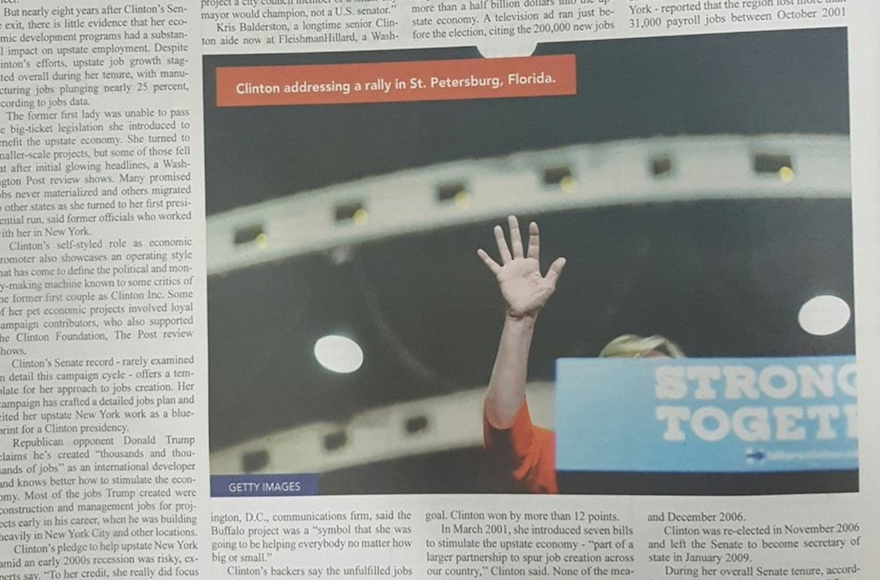
The Monsey-based newspaper Yated Neeman published a picture of Hillary Clinton taken at a Florida campaign rally, though only part of the Democratic presidential nominee is seen. (Onlysimchas.org)
Clinton breaks barriers when a Monsey, New York-based haredi Orthodox newspaper that typically bans women from its pages prints a photo of her. The catch: Only her arm and the very top of her head are visible.
September 2016

Donald Trump receiving a tallit from Bishop Wayne Jackson of the Great Faith Ministries in Detroit, Sept. 3, 2016. (Screenshot from YouTube)
Trump dons a Jewish prayer shawl given to him by a pastor during a visit to a black church in Detroit. The custom, which the pastor explains is a way of “anointing” prominent travelers, leads to puzzled and critical comments by Jewish observers.
Israeli Trump supporters open a campaign office in the West Bank in an effort to get Americans living there to cast their votes for the Republican nominee.
At a news conference at a Washington hotel, leaders of the alt-right movement praise Trump and try to explain their group’s support of “white legitimacy” in the face of immigration and the power of minority voters. The speakers disagreed whether Jews have a place in their white-majority ethnic state, but agreed that most Jewish organizations are on the “wrong side.”
In New York for the U.N. General Assembly, Netanyahu meets with Clinton and Trump in separate venues. Both presidential candidates pledge close defense cooperation with Israel, but Clinton lauds the Jewish state for serving as a model for pluralism, while Trump praises its erection of a separation wall between the country and the Palestinians.
While Israel is not a big topic of discussion in the first presidential debate, the two candidates spar on the Iran nuclear deal. “You started the Iran deal, that’s another beauty, they were about to fall” because of sanctions, Trump says to Clinton. The former secretary of state responds: “I would rather deal with the other problems having put that lid on their nuclear program.” Trump continues during the next two debates to use the nuclear agreement as an example of Clinton’s ineffectiveness, while she boasts of brokering the sanctions regime that bought Iran to the table.
October 2016

Pepe the Frog, an internet meme, has become a symbol of the alt-right, a loose confederation of white nationalists, nativists, anti-Semites and critics of “political correctness.” (Twitter)
The ADL teams up with the creator of the cartoon character Pepe the Frog in order to reclaim the image after it was co-opted by white nationalists as a symbol of their movement. An ADL task force also credits Trump supporters with the lion’s share of the anti-Semitic tweets aimed at journalists. The analysis sees a significant uptick in anti-Semitic tweets from January to July as coverage of the presidential campaign intensified and found that the top 10 most targeted journalists were all Jewish.
Hacked emails released by WikiLeaks show that Clinton hopes to repair ties with Netanyahu if she is elected president. One email quotes Clinton as telling American-Israeli Democratic donor Haim Saban that she hopes to invite the Israeli prime minister to visit the U.S. on the first day of her would-be presidency, and to meet with him “[h]opefully within the first month.”
A Washington Post analysis shows that the Clinton campaign’s top five donors are Jewish. The Clinton backers are Donald Sussman, a hedge fund manager; J.B. Pritzker, a venture capitalist, and his wife, M.K.; Saban, the Israeli-American entertainment mogul, and his wife, Cheryl; George Soros, another hedge funder and a major backer of liberal causes, and Daniel Abraham, a backer of liberal pro-Israel causes and the founder of SlimFast.
Facebook co-founder Dustin Moskovitz donates $35 million to groups supporting Hillary Clinton and other progressive causes. The relatively unknown Jewish billionaire says he believes “stakes are extremely high” in this election.
FBI Director James Comey is widely criticized for announcing 10 days before Election Day that the FBI had discovered additional emails that “appear to be pertinent” to the agency’s probe of Clinton’s private email server. The source? A computer belonging to defrocked Jewish congressman Anthony Weiner, the subject of an FBI probe into sexually explicit messages he allegedly sent to an underage girl and the estranged husband of top Clinton aide Huma Abedin.
JTA has documented Jewish history in real-time for over a century. Keep our journalism strong by joining us in supporting independent, award-winning reporting.






